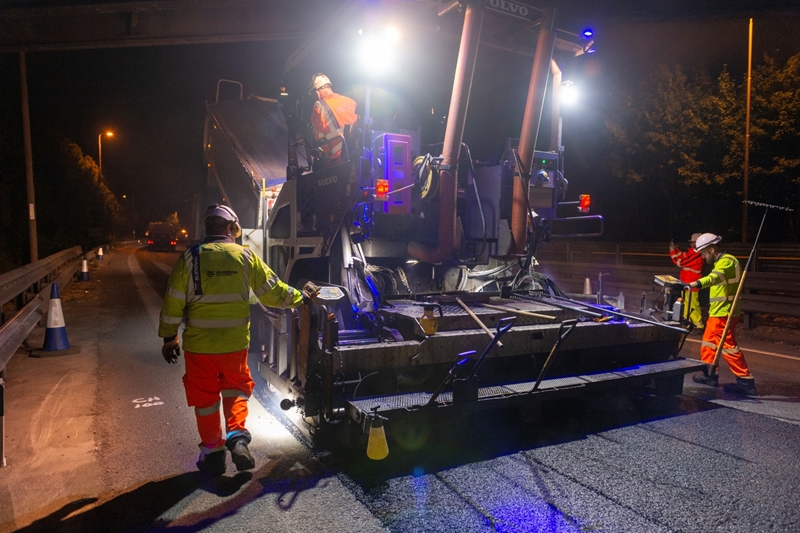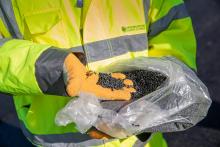
The UK’s National Highways is trialling Gipave, a graphene-enhanced polymeric asphalt additive developed by Iterchimica, which could extend pavement life while reducing the carbon footprint.
Graphene is the strongest compound discovered - between 100 and 300 times stronger than steel. For paving work, it acts as a reinforcement to the bitumen film surrounding aggregates in asphalt.
This is the first time Gipave has been applied on the UK’s strategic road network - major highways and motorways - and follows ongoing trials on local roads in the English counties of Oxfordshire, Kent, Staffordshire and Essex. Previous studies have shown Gipave has improved stiffness and resistance to rutting compared to conventional asphalt while improving fatigue endurance.
National Highways is the wholly government-owned company responsible for modernising, maintaining and operating England’s motorways and major A roads. The agency laid the trial pavement on the A12 northbound between the towns of Hatfield Peverel and Witham in eastern England in mid-August. It contained 40 per cent reclaimed asphalt. This is the highest level used in the UK for asphalt with a graphene-enhanced polymeric modifier. The performance of the material on the A12 will be monitored over several years.
The A12 trial is part of a National Highways research programme to test several emerging, low-carbon asphalt products and compare hot and warm mix technologies. It is being conducted with the help of industry partners Eurovia, Jean Lefebvre (UK), AtkinsRéalis, Iterchimica and Directa Plus.
“The combination of Gipave with high percentages of recycled asphalt has already demonstrated higher performances in similar contexts, extending the service life of asphalt pavements and resulting in greater benefits in terms of sustainability and circular economy,” said Lorenzo Sangalli, Gipave product manager at Iterchimica.
Gipave technology has already been adopted in Italy on the new San Giorgio Bridge in Genova and the Treviso Airport runway, on Rome Fiumicino Airport’s taxiway, the main motorways in northern Italy - A4 Turin-Milan and A4 Brescia-Padua - and the Formula One racing circuit in Imola. It has also been used on the airport taxiway in the Scottish capital Edinburgh.
Eurovia UK produced Iterchimica’s Gipave technology for installation on the A12 surfacing with support from specialist Jean Lefebvre UK for the mix design. AtkinsRéalis will closely analyse the performance of the 1km trial section including its carbon footprint and whole-life benefits, measuring it against a control section of standard polymer-modified bitumen asphalt.
“This trial of graphene-enhanced asphalt supports our 2040 net zero target for construction and maintenance and could provide significant whole-life benefits, improving the service life of both local and national networks,” said Umesh Parajuli, project sponsor and senior pavement advisor at National Highways.
“Eurovia are committed to limiting our carbon impact by moving towards a circular economy,” said Jonathan Core, technical director at Jean Lefebvre (UK). “This includes the implementation of professional recycling processes, implementing efficient techniques, adopting effective behaviour patterns, as well as looking at enhancing the durability of our products through the Research and Development of innovative materials and processes, such as Gipave.”
“The continued use of Gipave demonstrates the growing recognition of its ability to improve road durability and sustainability, aligning with our mission to deliver cutting-edge, eco-friendly solutions to the infrastructure sector,” said Giulio Cesareo, chief executive of Directa Plus.
Iterchimica, an Italian company founded in 1967 and based in Suisio, Bergamo, is a major international developer of products and technologies for asphalt pavement. Gipave is the result of a six-year research programme in collaboration with Directa Plus - producer and supplier of Graphene Plus - and the University of Milan-Bicocca.
Iterchimica said that up to now, all tests conducted by universities and laboratories have shown excellent results in terms of increased pavement performances, resulting in longer service life and reduced maintenance costs. In late 2021, Gipave obtained the certification Plastica Seconda Vita, Plastic Second Life. This registered mark is an environmental product certification system dedicated to materials and products manufactured by valorising plastic waste. The product has also finalised an EPD, an environmental product declaration certification. The methodology to produce an EPD is based on product life cycle assessment, following the ISO 14040 series of standards.
Directa Plus was established in 2005 and is based in Lomazzo, northwestern Italy. The company holds the Green Economy Mark from the London Stock Exchange which recognises companies that contribute to the global green economy. Directa Plus is one of the largest producers and suppliers of graphene-based products for use in consumer and industrial markets.
The company's graphene manufacturing capability uses proprietary patented technology based on a plasma super expansion process. Starting from natural graphite, each step of the Directa Plus production process - expansion, exfoliation and drying - creates graphene-based materials and hybrid graphene materials ready for a variety of uses and available in various forms such as powder, liquid and paste.
This proprietary production process uses a physical process, rather than a chemical process, to process graphite into pristine graphene nanoplatelets, which enables Directa Plus to offer a sustainable, non-toxic product but without unwanted by-products. Directa Plus products are made of hybrid graphene materials and graphene nano-platelets. The products, marketed as G+, can be categorised into various families, with different products being suitable for specific practical applications.
AtkinsRéalis is a global engineering services and nuclear company dedicated to sustainable solutions that “connect people, data and technology to transform the world's infrastructure and energy systems”. It delivers end-to-end services across the entire life cycle of an asset including consulting, advisory/environmental services, intelligent networks/cybersecurity, design/engineering, procurement, project/construction management, operations/maintenance, decommissioning and capital.










